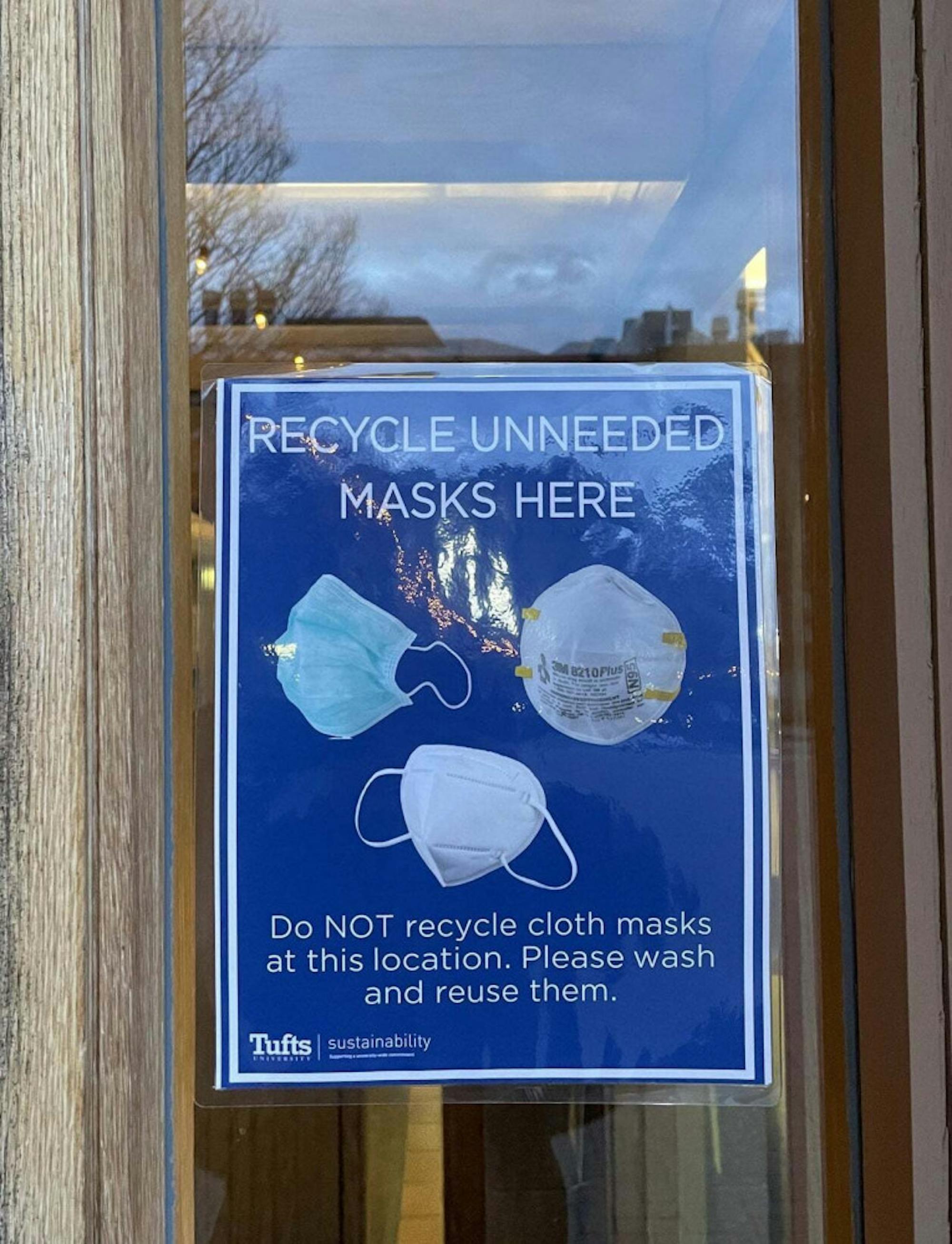During the COVID-19 pandemic, masks have become an essential part of daily life. Unfortunately, single-use masks generate a lot of waste, which is important to consider amid climate change. A mask recycling initiative implemented by the Office of Sustainability aims to manage this increased waste. TheOOS Recycling and Waste Reduction Coordinator, Kaitlyn Reed, oversees this initiative. Reed feels the initiative is important in drawing attention to the number of masks that Tufts goes through as well as focusing on managing waste aside from traditional recycling bins.
“You want to always be looking for different ways to expand waste streams and to figure out better ways and more effective ways to divert because we want the landfill to be the last resort location for an item to end up,”Reed said.
Mask recycling first came to the Tufts community at the start of the pandemic when the Office of Sustainability put a few mask recycling locations on the Grafton campus. Prior to the university requirement of single-use medical masks, the Office of Sustainability had been encouraging the use of reusable masks. Once they could no longer do this, Reed worked with the Office of Sustainability to bring the mask recycling initiative to the Medford/Somervillecampus.
“There is always a balance between sustainability initiatives and public health, and I think that was something that we kind of had to navigate and adapt to,”Reed said. “That’s how we ended up implementing mask recycling on this campus because we want to always be adapting to the best public health options and then, from there, finding the most sustainable option.”
Once the bins are full of masks, they are shipped to Terracycle, a company that focuses on waste elimination by turning recycled materials into consumer products.
“[Terracycle] has a system to clean and sort the masks and get rid of contamination, if there is any, and then it gets turned into composite deck furniture,”Reed said.
The Office of Sustainability also works to divert waste in other ways aside from mask recycling through the recycling of other types of used goods like plastic film, batteries and small electronics. Another on-campus recycling initiative is the “freecycling” program which allows people to give away their goods for reuse rather than disposal.
“If you are trying to get rid of an item that is perfectly good that you don’t want anymore, you can use a freecycle location,” Reed said. “If you have three water bottles but you only want one … don’t put [them] in the landfill, give them to someone who can use [them].”
Mask recycling bins on campus can be found using the Office of Sustainability’s online Eco-Map or on their website. Under Reed’s direction, a group of interns and other Tufts community members manage these bins across the university’s different campuses. While the Office of Sustainability wants to encourage students to recycle as many masks as they can, Reed emphasized that students cannot set up their own mask recycling bins in dorms because this violates masking guidelines.
“I want people to be excited about finding ways to divert waste,” Reed said. “But we do have to make sure and be cautious that we are continuing to follow the guidelines that are set out from health and safety.”
The mask recycling bins are funded through the Tufts Green Fund. The Green Fund is an endowment that gives grants to Tufts community member projects that help promote sustainability on campus. The Green Fund selection committee is responsible for determining grant recipients for sustainability initiatives. Assistant Professor of Public Health and Community Medicine Laura Corlin joined the Green Fund selection committee this winter, and she said that all members of the Tufts community are encouraged to submit proposals for sustainability initiatives on campus.
“This is a really amazing resource on campus,”Corlin said. “Students can generate and implement really high impact ideas to ensure that our campus is meeting our local [and] global sustainability goals.”
To be awarded a grant from the Green Fund, an applicantmust submit their project ideas in the fall to be reviewed and selected by the Green Fund selection committee. The applicants awarded the grant can then use this money to implement their project. While Corlin has not gone through an application cycle as part of the selection committee yet, she will be part of this process in the fall alongside her fellow committee members.
“It’s a cool committee because you have people represented from across the university and all the different campuses and also people who are staff and faculty and students,” Corlin said. “I really like that about Green Fund because I think it’s a nice way to think about all the constituencies on campus.”
According to former Green Fund intern Tom Paugh, the Green Fund gets its finances from the Sustainable Investment Fund’s endowment payout, which allows for a budget of $40,000 that goes towards grants. While interning at the Green Fund, Paugh worked alongside the selection committee during the grant application process. Paugh sees the mask recycling initiative as an important resource in response to the large amounts of waste that have been generated due to mask use.
“Providing community members with a resource to help reduce landfill waste is extremely important and can help increase awareness about the environmental impact of single use items like masks,”Paugh, a junior, wrote in an email to the Daily.
Paugh encourages students to get involved in the Office of Sustainability. Some ways that Paugh suggested for students to promote sustainability on campus are signing up for the Office of Sustainability newsletter, getting involved with the Office of Sustainability green move-out, talking with Eco Reps and going to Office of Sustainability-sponsored events.
“Get involved with the OOS in any way you can,” Paugh wrote. “It is a great way to learn more about environmentalism and make a direct impact on the Tufts community.”






